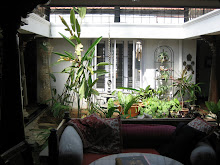
This tea is from teamasters, and came quickly and with some bamboo charcoal that can be added to further purify the water. Pictured is the varied, twiggy, and aged piece.
Upon first brewing I used close to my regular amount of 8-10 grams, you just go by feel anyway. The first rinse yielded a mulchy steam, prepping my senses for the tea to come. The first brew for 30 seconds yielded some dark and complex looking, with a very familiar puerh/forest aroma.
My notes on the session indicate brewing times of 30s, 25s, 50s, 60s, 90s, 120s, 5 min, 12 min. By the second infusion I was sure I recognized the flavor... Hmm... Shupu! Almost exactly like

some of the doughy and smooth flavors of the 2008 12 Gentlemen Shu. Why is tea shopping on the internet so difficult (sarcasm) for teas from china (more sarcasm)? The tea had me mad for about 3 more sips when a pleasant wave of qi hit me immediately lifting my doubts of a substandard tea. Its a nice tea, to be sure, it has the elements of being a rather basic puerh in terms of taste, aroma, huigan, transition, and durability, but possessed such a strong qi that I couldn't help but lean back and marvel at the feeling of all my tension melting melting away.
I have added in some close up of the leaves... which may be the most fun leaves I've had to peruse in a while. The variance is pretty incredible; I've had giant wild looking buds, and lots of leaves that just wouldn't unfurl in the gaiwan, and had to be fanned out by me just to see what the looked like. I've heard that leaves that don't unfurl are a sign of bad quality, but my suspicion is that something went wrong during one of the production processes, because I've also noticed all lot of different colored leafs, even one that was half green half brown.

The darker leaf has somehow lost some body but maintained its interior vein structure. It was surprisingly firm and rigid, and like all the Jiang Cheng leafs had trouble unfurling. I thought my picture has better but you can also see a very undecayed and veiny leaf up front with a visible saw edge. All in all, tasty but not too interesting, until the qi makes you not care and just sip away.
Smooth, active, mellow...
 I should probably go back here.
I should probably go back here.












